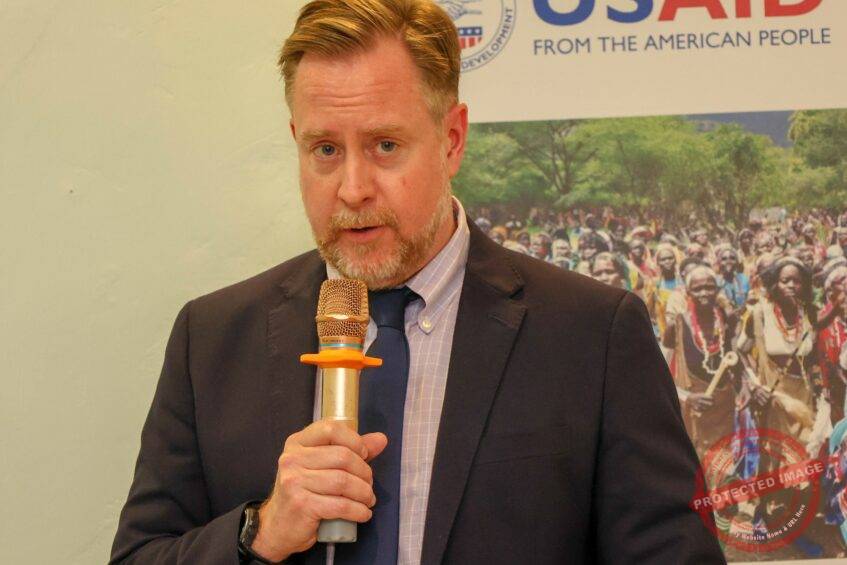
Derren Manning, USAID - Director of Democracy and Governance during the launch of Shejeh Salam’s Gender Equity, Disability, and Social Inclusion Training Guide in Juba on Tuesday, March 28, 2023 - Photo: Awan Moses/Eye Radio
The US Agency for International Development expressed its commitment to supporting the implementation of more inclusive and equitable development programs in South Sudan.
Darren Manning, the Director of USAID South Sudan’s Office of Democracy and Governance says the marginalized communities in South Sudan are suffering disproportionately from inequality and discrimination.
He raised this concern during the launch of Shejeh Salam’s Gender Equity, Disability, and Social Inclusion Training Guide in Juba on Tuesday, March 28, 2023.
The program is supported by DT GLOBAL with funding from the agency and aims to strengthen deliberate efforts to integrate diversity and gender transformative measures in development and resilience activities.
It will also reduce the chances for social exclusion of marginalized groups within grant activities and ensure women, youth, community leaders, and other vulnerable groups can meaningfully participate in the implementation of USAID activities.
The guide will further identify relevant issues surrounding gender and inclusion in target communities, as well as opportunities to utilize the lessons learned and best practice strategies.
The initiative is well-timed with the release of USAID’s revised Gender Policy.
With the program launch, USAID is calling for greater inclusion of women in breaking the bonds of gender inequality-something it says remains one of the most pervasive forms of discrimination in the country.
The senior US government official says women and girls, people with disabilities, and other vulnerable communities suffer the most from violence, sexual assault, and discrimination.
According to Manning, traditional customs, cultural norms, and community perceptions often place a lower status upon women in South Sudan, and common misconceptions regarding gender equality create significant challenges to effectively communicating the value of gender equity and social inclusion.
He added that it is critical that USAID activities make a concerted effort to clearly integrate relevant GEDSI issues in planning, discuss how projects respond to these factors, review what is achieved, and build from those achievements.
The determination, he says, is pursued through a process of planning and implementing activities that guarantee equal participation of historically marginalized communities such as the poor, women, youth, and persons with disabilities.
“Women and girls, the disabled, and other vulnerable communities suffer the most from violence, sexual assault, and discrimination,” said Manning.
“Gender inequality remains one of the most pervasive and serious forms of discrimination in South Sudan, but a greater inclusion of women will ensure progress for all in South Sudan,
“This training guide will strengthen Shejeh Salam’s deliberate efforts to integrate diversity and gender transformative measures in all activities,
” Furthermore, it will reduce the chances for social exclusion of marginalized groups within grant activities and ensure women, youth, community leaders, and other vulnerable groups can meaningfully participate in the implementation of USAID activities”.
For her part, Jill Morris, Shejeh Salam’s Chief of Party says her organization seeks to conduct awareness against social inequalities to usher behavior change.
She added that it will also promote a society that is diverse with significant inclusion of gender including the vulnerable people in the societies.
This, according to her, will help address some of the social norms that are harmful to the communities.
“One of the things we are trying to look at is to have awareness of what social inequalities and inequities are in South Sudan,” she said.
“We are looking for behavior change, we are looking to address some of the social norms that might be harmful, we are also looking to have inclusion,
“We have our communities to be diverse and to be included with everybody, we are talking about men and women, boys and girls, we are talking about community leaders, people who are disabled, and people who might be marginalized,
“We want everybody to have their voices heard and to be included in the development and moving forward with their communities”.
Support Eye Radio, the first independent radio broadcaster of news, information & entertainment in South Sudan.
Make a monthly or a one off contribution.
Copyright 2024. All rights reserved. Eye Radio is a product of Eye Media Limited.